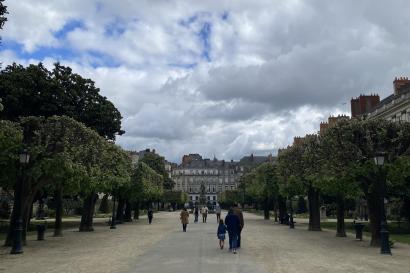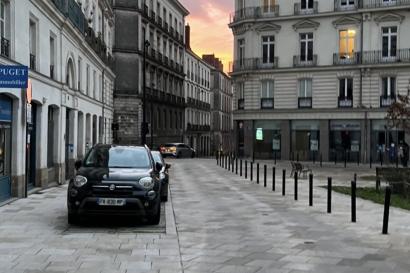Packing is one of the more difficult parts of the study abroad experience- you want to be sure that you’re bringing everything you might need, while not bringing extra stuff that will only weigh you down while travelling to and from Nantes.
Before you pack your bags, make sure you think critically everything you’re bringing everything you’re not. This list is based off my own experiences in Nantes, what I ended up being grateful I brought and everything I wished I left at home.
What to Bring:
Scarf:
The stereotype holds true. French people really do love scarves! I’m not a big scarf wearer but I brought two just for the fun of it (they take up zero space and weigh nothing) and they ended being an absolute godsend. During the Nantes winter season, you won’t want to step outside the house without a warm scarf wrapped around your neck!
Raincoat:
Nantes is rainy! Don’t forget a raincoat. Like Paris, you won’t get any snow during the winter but there will be LOTS of rain. A raincoat is very useful to keep the drizzle from dampening your day.
Umbrella:
I did not bring an umbrella, and ended up regretting it. You can also purchase one here, but if you have a nice compact one you’re attached to, I suggest you bring it. A raincoat doesn’t really cut it when it’s pouring outside, something I learned the hard way. You can also definitely purchase one here.
Shoes:
If you normally don’t walk places, you might not be aware how important proper footwear is. In Nantes, and France in general, EVERYWHERE is walkable, and you’ll be able to experience the city in a different way than from the back of a bus of the seat of a tram. I walked to the IES Abroad center every morning, about 20 minutes, because waiting for the bus just didn’t really interest me. Not only that, it was a great way to familiarize myself with the city and pop into a bakery on the way for a morning Pain au Chocolat. Being able to walk wherever you need to go is a privilege we don’t necessarily have in the United States, so take advantage and pack some comfy shoes to make sure your feet aren’t too “culture shocked” by the amount of walking.
If you are also interested in hiking, bring your hiking boots! It’s a matter of priorities. I knew I wanted to hike in France so I made sure to save space for my hiking boots. I even wore them around town when it was rainy because they are much more water-resistant than my canvas sneakers.
Personally, I brought three pairs of shoes. Sneakers, hiking boots, and tennis shoes. Others in the program brought around six pairs. It’s all up to you, but make sure you are considering all aspects of the shoes you’re bringing—are you going to be able to wear them and walk all day without your feet hurting? For formal shoes, will you really use them all that much? Up to you to decide, but be honest with yourself because it will be so much better in the long run if you're not carrying around stuff you won't wear!
American Medicines:
In France, there are many equivalents to American medicines. There are some notable exceptions, however, that many students at the center bemoaned when they got sick. DayQuil and NyQuil are the big ones. You cannot get either of them in any pharmacy in France, nor anything with equivalent ingredients. Bringing a pack of each can’t hurt, it takes up very little room and even if you don’t use it, I guarantee that someone in the program will be begging for it as some point in the semester when they get a terrible cold. If there’s medicines that you take to combat common illnesses you think you might get while abroad, look them up and see if they or equivalents are sold in France. If not, I suggest bringing a pack or two.
One Semi-Formal Outfit:
You will definitely have the chance to go to a nice restaurant while in France if you choose to. I suggest bringing a button-down collared shirt and khaki pants (these can be everyday wear too) or a nice dress so that you don’t feel awkward in a t-shirt and sweatpants. As for shoes, I brought only my everyday canvas sneakers to “dress down” my formal wear, giving it more of a business casual feel. This meant I didn’t need to bring a pair of dress shoes.
Portable Charger:
A portable charger is REALLY useful for long train trips, airport layovers, and everything in between. An indispensable item really.
Water Bottle:
A water bottle is a must bring. Staying hydrated makes for a much better study abroad experience, and it is really annoying to keep buying plastic water bottles everywhere you go.
Adapter:
French outlets are different, so you’re going to need an adapter. I recommend getting adapters that simply plug onto the end of your American plugs. I had a large power bank that plugged in and had several outlets, but it was bulky and made a whirring sound that made it hard to sleep—the exact time you want to charge your devices was when I wanted it off! So, get the individual plugs, they’re much more portable and don’t make noise.
What to Leave Behind:
Notebooks, folders, school supplies:
You can buy all of these in France. They honestly have a better selection of school supplies than in the US, there are so many cool pens and notebooks. I just liked to look at the fancy stuff—I bought the cheap generic version of everything to take notes and complete assignments.
Basic toiletries:
Don’t stress too much about cotton swabs, toothpaste, floss, mouthwash, or anything like that. If you have a really strong preference, go ahead, but you can find anything you might need at Monoprix or U Express (grocery store chains).
Shorts:
It’s true, the French do not wear shorts. I knew this and still brought about 4 pairs, thinking I would prioritize comfort on hot days over fitting in. The thing was—there were no truly hot days. I can count on one hand the amount of times I wore shorts when I wasn’t running. It just didn’t get hot enough in Nantes in the spring semester to justify them, so they sat in a drawer and took up space in my suitcase.
General Tips:
All in all, just trust your gut and you can’t go too wrong. Don’t try and pack everything you might possibly need, just prioritize the things you will most likely need and then work from there. Make sure your clothes can work with multiple outfits and they’re durable enough to make it through the semester. Don't stress, just use best judgement and know that you most likely won't underpack. And remember—downtown Nantes has everything you could possibly need, and is a great place to find anything you didn’t pack for one reason or another.

Tyler Schmied
Hi, I'm Tyler! I'm an International Relations and French double major studying abroad in Nantes, France. I love to travel to new places and meet new people! In my spare time, I enjoy reading, hiking, watching movies, and biking.







